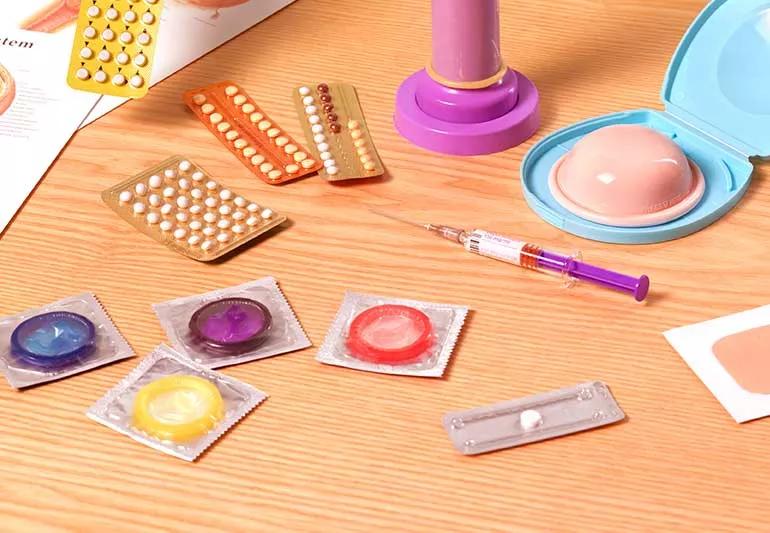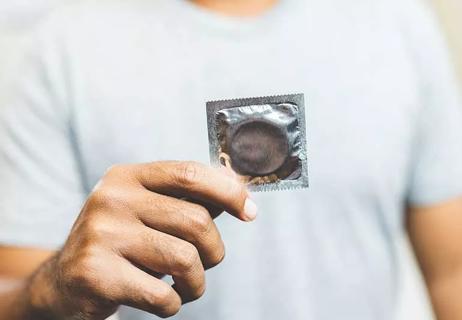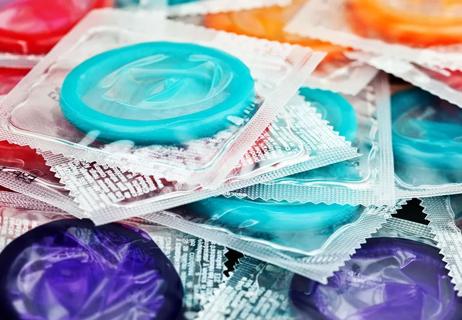Yes, there is a condom that will fit

Condoms are often part of safe sex and contraception discussions because, when used correctly, they’re effective for birth control and sexually transmitted infection (STI) prevention.
Advertisement
Cleveland Clinic is a non-profit academic medical center. Advertising on our site helps support our mission. We do not endorse non-Cleveland Clinic products or services. Policy
But there’s quite a bit of confusion out there about condoms. Do they truly protect against herpes? Are two condoms better than one? Are some penises really “too big” for every condom out there? Physician assistant and sexual health expert Evan Cottrill, PA-C, AAHIVS, HIVPCP, helps clear up common myths about condoms.
First, some basics. What are the different types of condoms? There are two main types:
There are also dental dams, which act as a barrier during oral sex of any kind.
All types of condoms reduce the risk of transmitting STIs through bodily fluids. Condoms also prevent pregnancy by keeping semen from entering the vagina. There are many other methods of birth control to prevent pregnancy, but a condom can also protect you from STIs. This is also true if you’re having anal sex.
Below, Cottrill walks us through nine facts about condoms and debunks some popular myths along the way.
Condoms made from latex, polyurethane and other synthetic materials can protect you from STIs. But lamb cecum condoms, also called natural membrane or lambskin condoms, can allow viruses to pass through.
Advertisement
If you’re only concerned about preventing pregnancy, lambskin condoms are fine. But if you want protection from STIs, use a latex or polyurethane condom.
If someone has ever told you, Condoms don’t fit me, don’t buy it — this is a myth.
“Anatomic size varies, of course,” says Cottrill. “But there is a condom that can fit every person.”
Most penises don’t require a special condom size. But if needed, there are larger — and smaller — condom sizes available. If you can’t find the right fit at your local grocery store, try searching for them online.
“Yes, when you use condoms consistently and correctly, they do protect against herpes,” says Cottrill.
The myth that condoms don’t protect against herpes probably came from people who weren’t using them correctly or weren’t using them enough. Herpes is a lifelong condition that spreads through close contact with someone who’s had the infection — even when they’re not having an outbreak and show no signs or symptoms of infection. Herpes can also spread through oral sex and by sharing sex toys, which means it’s important to use a dental dam or condom when participating in these activities.
“You need to use condoms for all types of sex, including oral sex, to prevent the spread of herpes,” states Cottrill.
“Condoms most definitely reduce the risk of transmitting HIV,” says Cottrill.
However, when it comes to protecting against the spread of viral STIs, such as HIV, hepatitis C and herpes simplex virus (HSV), the condom material matters. For the best protection, avoid lambskin condoms and use latex or polyurethane instead.
Yes, condoms protect against human papillomavirus (HPV) infection.
“Condoms are effective against any STI, whether bacterial or viral,” notes Cottrill. He again emphasizes that latex and polyurethane condoms — not lambskin — are your best protection.
“This is a very popular question,” says Cottrill. “I do not recommend keeping condoms in your wallet because heat lowers the quality of the material over time. Plus, the packaging can get torn or opened.”
It’s also not a good idea to keep condoms in your car, which can get very hot in the sun. It’s best to store condoms in a cool place where the package won’t get crushed, folded or punctured.
It might seem logical that two condoms would be better than one — twice the protection or something like that, right? But it’s actually the opposite.
“Do not use two condoms at the same time,” says Cottrill.
Friction during sex can weaken the condoms as they slide against each other, leading to breakage. You also don’t want to wear external condoms while your partner wears an internal condom for the same reasons. Using one condom at a time is most effective.
Advertisement
Choosing the right lubricant depends partly on the type of condom you’re using. If you’re using latex, stick with silicone or water-based lubricants. Don’t use oil-based substances such as petroleum jelly (Vaseline®), lotion, massage oil or coconut oil, as these can weaken the latex and lead to tears.
But you can use oil-based lubricants with condoms made of polyurethane or other synthetic materials, as these won’t break down so easily.
Yes, condoms expire, and it’s important to look at those dates.
“It’s best not to use a condom that’s past the date printed on the package or over five years old,” cautions Cottrill.
The condom material breaks down over time, so an older condom is more likely to tear during sex.
When choosing a condom, consider:
Advertisement
No matter what type of condom you’re choosing, use a new condom every time and follow the directions on the package to minimize the risk of slippage, leakage or breakage. If your condom does tear or break while you’re having sex, stop immediately and replace it with a new condom. If you’re concerned about possible pregnancy or STIs, make an appointment with a healthcare provider.
If you’ve tossed the box and need a refresher on how to properly use external condoms, the Centers for Disease Control and Prevention (CDC) has a handy guide for using external condoms.
Advertisement
Learn more about our editorial process.
Advertisement

Turn to emergency birth control and STI tests

Most condoms will fit most people, but other factors matter, too

Go for latex-free options if you experience sensitivity

The little blue pill might help with physical arousal, but there are better treatments for low libido in women

Start having sex about 72 hours before ovulation, then at least every other day during your fertile window

The Yuzpe regimen is less effective than other forms of emergency contraceptives, and it’s associated with more side effects

Arousal without orgasm can be uncomfortable, but it’s no reason to pressure sexual interactions

Testosterone therapy may be an option for women to help address low libido

Wearing a scarf, adjusting your outdoor activities and following your asthma treatment plan can help limit breathing problems

Your diet in the weeks, days and hours ahead of your race can power you to the finish line

When someone guilt trips you, they’re using emotionally manipulative behavior to try to get you to act a certain way